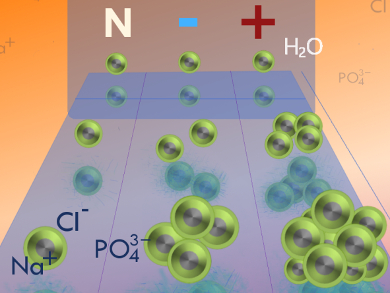The colloidal stability of magnetic nanoparticles in biological fluids is highly relevant to their physical and biological functionalities for in vivo studies.
Aitziber L. Cortajarena, Francisco J. Teran, and colleagues, CIC biomaGUNE and iMdea Nanociencia, Spain, have determined the physicochemical properties of fifteen different combinations of magnetic iron oxide nanoparticles (IONP) covered with biocompatible coatings. The study aims to establish criteria for the prediction of the colloidal stability of nanoparticles dispersed in phosphate-buffered saline or human blood plasma. These criteria are based on the hydrophilicity and the net surface charge of the pristine nanoparticle coating in water dispersion.
Overall, protein adsorption increases with the particles’ net surface charge value. The sign of the charge does not influence the change in organic mass but tightly governs nanoparticle aggregation, which is remarkably more pronounced for positively charged surfaces (e.g., amine or chitosan) compared to negatively charged ones (e.g., dextran or dimercaptosuccinic acid).
The researchers conclude that neutrally charged and hydrophilic coatings like PEG300 molecules with -COOH or -NH2 attached to dextran molecules show the most suitable features to preserve the colloidal stability and magnetic properties of IONP, which is beneficial for their use in in-vivo studies.
- Elucidation of the Physicochemical Properties Ruling the Colloidal Stability of Iron Oxide Nanoparticles under Physiological Conditions,
Antonio Aires, David Cabrera, Laura C. Alonso-Pardo, Aitziber L. Cortajarena, Francisco J. Teran,
ChemNanoMat 2017.
DOI: 10.1002/cnma.201600333
